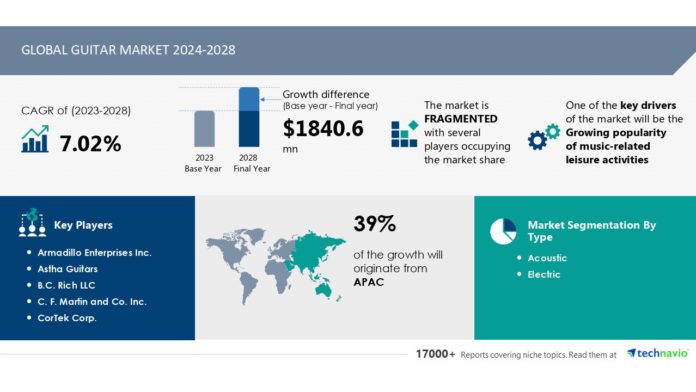The global guitar market size is estimated to grow by USD 1.84 billion from 2024-2028, according to Technavio. The market is estimated to grow at a CAGR of over 7.02% during the forecast period. Growing popularity of music-related leisure activities is driving market growth, with a trend towards growing online retailing. However, long replacement cycle of guitars poses a challenge. Key market players include Armadillo Enterprises Inc., Astha Guitars, B.C. Rich LLC, C. F. Martin and Co. Inc., CorTek Corp., Fender Musical Instruments Corp., G and L Musical Instruments, Gibson Brands Inc., Godin Guitars, HOSHINO GAKKI Co. Ltd., Karl Hofner GmbH and Co. KG, Kiesel Guitars, Paul Reed Smith Guitars, Rickenbacker International Corp., Roland Corp., Schecter Guitar Research Inc., TAKAMINE GAKKI CO. LTD., Taylor Listug Inc., The ESP Guitar Co., and Yamaha Corp..
The global guitar market is undergoing a transformation as consumer behavior and distribution channels evolve. Online retailing is a leading trend, providing unmatched convenience for guitar enthusiasts. This accessibility eliminates geographical restrictions and expands the market to a global audience. Online platforms offer a vast selection of guitars, brands, models, and price ranges, along with comprehensive product information. Many manufacturers and boutique brands sell directly to consumers online, fostering customer engagement and loyalty. Customization options and advanced technology, such as VR and AR, enhance the shopping experience. Online retailers provide educational resources, tutorials, and forums for the guitar community. Price transparency and competition drive demand, leading to potential growth in the guitar market.
The guitar market is experiencing significant growth due to increasing trends in music education programs in school curricula and global schools. Curriculum policies prioritizing music education have led to higher product demand. Musical bands continue to be popular among adolescent population, fueling the leisure activity sector. Online retail platforms like E-commerce, Guitar Center, and others, have made buying musical instruments, such as solid-body electric guitars, acoustic guitars, and pianos, more accessible. Dubai and UAE’s economies, with high internet penetration, have seen a surge in demand for digital music tools and online performances. Commercial music schools and colleges are also thriving. Demographic trends show a rise in rock music, metal, and live music shows, boosting the market. String instruments, including guitars, remain a staple in the musical instrument industry.
The guitar market caters to consumers who value the reliability and quality of branded musical instruments. Vendors prioritize durability in their designs, addressing environmental factors that can impact the longevity of wooden guitars. They use high-grade materials, such as wood and other raw components, to create lightweight and robust instruments. Extensive research and development efforts introduce innovative, long-lasting materials to extend guitar lifespans. Acoustic guitars typically last ten years, while electric guitars can endure for 20-30 years. Despite replacement sales being common in commercial applications, the extended lifespan of guitars limits market growth due to fewer replacements. Manufacturers provide product warranties and guarantees, while adherence to industry regulations ensures durability. The guitar market’s long replacement cycle is anticipated to restrain its growth throughout the forecast period.
In the dynamic music industry, guitar sales face unique challenges. With live music shows on hold due to the pandemic, string instruments like electric and acoustic guitars have seen varying demand. E-commerce and retail stores like Guitar Center adapt, selling six-string musical instruments to students learning rhythm and lead parts for rock and metal genres. Amplification solutions, from small amplifiers to PA systems, remain essential for making guitars louder. Famous musicians’ video conferencing lessons and digital whiteboards fuel online music education. Consumer interest in wood-based guitars, piano, and other musical instruments continues, with premium segment sales strong. Competitors in the market include music schools and hobbies like YouTube, apps, cloud-based systems, and digital sheet music. Sales of guitars, whether acoustic or electric, remain robust, driven by consumer passion for music.
The Guitar Market is a thriving industry with numerous businesses selling various types of guitars and related accessories. These businesses cater to diverse customer segments, including beginners, hobbyists, and professional musicians. They offer a wide range of products, from acoustic to electric guitars, and provide excellent customer service to ensure customer satisfaction. Successful businesses in this market implement effective marketing strategies, maintain competitive pricing, and offer quality products to stay ahead of competitors.
The global electric guitar market is experiencing significant growth driven by increasing interest in music and rising disposable incomes. Key players like Fender, Gibson, and Yamaha dominate the market, continually innovating to meet diverse consumer preferences. The popularity of online music learning platforms and the influence of rock and pop culture further propel market expansion. Additionally, the growing trend of live music events and concerts contributes to increased demand. With technological advancements and a broadening consumer base, the electric guitar market is poised for sustained growth in the coming years.
Guitar Market: A Vibrant World of Six-String Magic! Discover the enchanting realm of guitar market, bursting with a diverse range of string instruments. From electric to acoustic, these six-string wonders ignite the stage at live music shows, fueling the rhythm and lead of rock and metal bands. The marketplace is a melting pot of e-commerce and retail stores, where consumers connect with their favorite musical instruments. Acoustic guitars, with their rich, resonant sound, are perfect for solo performances or collaborative jam sessions. Electric guitars, on the other hand, amplify the energy with their powerful sound, made louder through small amplifiers or PA systems. Students hone their skills at music schools, inspired by famous musicians showcased on YouTube. In today’s digital age, the guitar market adapts with video conferencing, file sharing, and instant messaging, allowing musicians to connect and learn from anywhere. Digital whiteboards and sheet music offer new ways to explore music theory, while pickups and amplification technology continue to innovate, enhancing the overall sound experience.
Guitar Market: A Thriving Industry of String Instruments and Live Music The guitar market is a vibrant and dynamic industry that caters to the needs of musicians and music enthusiasts worldwide. This market encompasses various types of string instruments, including electric and acoustic guitars, and extends to related accessories such as amplification systems, picks, and strings. Live music shows remain a significant driver of demand for guitars, with both amateur and professional musicians utilizing these instruments in various genres, from rock and metal to classical and folk. The market’s reach extends beyond traditional retail stores to e-commerce platforms, enabling global access to musical instruments. Acoustic guitars, with their warm, resonant sound, continue to be popular choices for students and hobbyists, while electric guitars, with their amplified sound and versatility, dominate the premium segment. The market also caters to the needs of music schools, with digital whiteboards, video conferencing, file sharing, and digital sheet music facilitating online music education. Demographic trends, such as the adolescent population’s growing interest in music and leisure activities, fuel sales of guitars. The market’s growth is further driven by technological advancements, including solid-body electric guitars, small amplifiers, PA systems, and digital music tools. The promotion industry and online performances also contribute to the market’s expansion, with virtual classes and houses of famous musicians offering instruction and inspiration to students worldwide. Competitors in the guitar market include various musical instrument manufacturers and retailers, with Guitar Center being a notable player. The market’s growth is influenced by consumer interest, economic factors, and curriculum policies in global schools and music education programs. The UAE and Dubai, with high internet penetration and a thriving music scene, present significant opportunities for market expansion. In conclusion, the guitar market is a thriving industry that continues to evolve, driven by technological advancements, changing consumer preferences, and the enduring appeal of music. Whether for hobbyists, students, or professional musicians, the guitar remains a beloved instrument that brings joy and creativity to people around the world.







